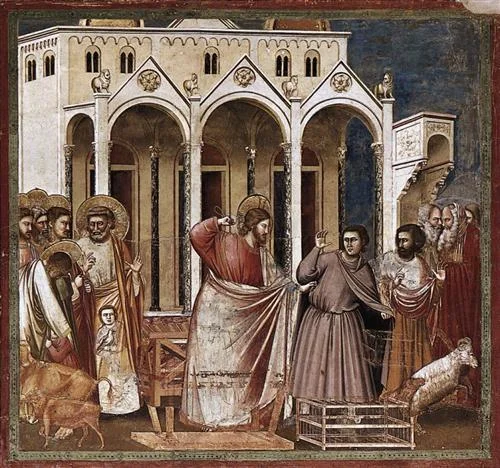At the heart of the Celtic tradition is a reverencing of Christ as 'Son of the elements'. In his body and blood is the wildness of God. With a passion of love he comes to bring 'fire to the earth'. J. Philip Newell
Expulsion of the moneychangers, Giotto
He made a whip out of cords, and drove all from the temple courts, both sheep and cattle; he scattered the coins of the money changers and overturned their tables. To those who sold doves he said, “Get these out of here! Stop turning my Father’s house into a market!” His disciples remembered that it is written: “Zeal for your house will consume me.” John 2:15-17
At the heart of the Celtic tradition is a reverencing of Christ as 'Son of the elements'. In his body and blood is the wildness of God. With a passion of love he comes to bring 'fire to the earth'.
In our religious traditions we have sought, almost exclusively, the gifts of peace and calm for our souls, while neglecting to seek the inner stirrings of creative wildness.
J. Philip Newell, The book of creation
The wildness of God
Zeal is commended, and zeal is feared. We are skeptical of it, yet also jealous for it. When we read of Jesus wielding a whip, and cast our eyes at an image (such as Giotto's above) showing a flex arm muscle and a posture of threatening intent what am I to do with it?
The passage and image maintain that God is wild. The wind blows wherever it pleases...so it is with everyone born of the Spirit*. The wildness of God, like the elements, is part and parcel of the mystery of who God is - and who we are, notwithstanding our suppressions and exaggerations. Jesus adds to his incendiary words a violent protest and pushes the religious authorities toward their tipping point. For them things are getting out of hand. How might I, though, allow this wild God the same breadth that Jesus claimed in his actions and beliefs?
*John 3:8
